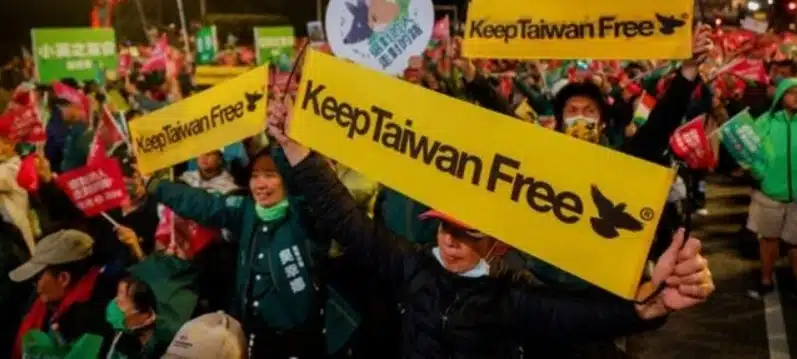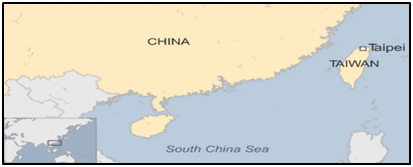What’s in today’s article?
- Why in news?
- China-Taiwan Relation
- Geographical location of Taiwan:
- China – Taiwan Dispute
- Who recognises Taiwan?
- India-Taiwan relations
- News Summary: China – Taiwan Relation
- Taiwan’s transition to democracy
- China – Taiwan Relation: Current Status
Why in news?
- On January 13, Taiwan will vote to elect its next President and legislature.
- With Taiwan’s complicated ties to China and rising global tensions, the election result could be a big deal for the island.
- China, despite never ruling Taiwan, insists it’s theirs and has not ruled out using force to claim it, home to 24 million people.
Geographical location of Taiwan
- Taiwan is located north of the Philippines and the South China Sea.
- It is about 180 km off the south-eastern coast of China.
- It is separated from the mainland by the Taiwan Strait.
China – Taiwan Dispute
- Background
- The island seems to have first appeared in Chinese records in AD239, when an emperor sent an expeditionary force to explore the area.
- This evidence is used by Beijing to back its territorial claim.
- After a relatively brief spell as a Dutch colony (1624-1661), Taiwan was administered by China’s Qing dynasty from 1683 to 1895.
- In 1895, Japan won the First Sino-Japanese War, and the Qing government had to cede Taiwan to Japan.
- After World War Two, Japan surrendered and relinquished control of territory.
- The island seems to have first appeared in Chinese records in AD239, when an emperor sent an expeditionary force to explore the area.
- Civil War
- When Japan surrendered, The Chinese Nationalist Party (also known as the Kuomintang, KMT) began ruling Taiwan with the consent of its allies, the US and UK.
- Chiang Kai-shek was the ruler of this party.
- However, almost immediately following Japan’s surrender, the Chinese Civil War broke out between the KMT and the Chinese Communist Party (CPC).
- Chiang and the remnants of his Kuomintang government fled to Taiwan in1949.
- When Japan surrendered, The Chinese Nationalist Party (also known as the Kuomintang, KMT) began ruling Taiwan with the consent of its allies, the US and UK.
- Disagreement and confusion about Taiwan
- China regards Taiwan as a breakaway province which it has vowed to retake, by force if necessary.
- China has repeatedly insisted that Taiwan should be called Chinese Taipei, in efforts to prevent international recognition of Taiwan as a country.
- But Taiwan’s leaders argue that it is a sovereign state. Taiwan continues to participate in international events and dialogues separately.
- It has its own constitution, democratically-elected leaders, and about 300,000 active troops in its armed forces.
- China regards Taiwan as a breakaway province which it has vowed to retake, by force if necessary.
Who recognises Taiwan?
- Initially, Chiang Kai-shek’s Republic of China (ROC) government held China’s seat on the United Nations Security Council.
- In the Cold War, the Taiwanese government in Taipei emerged as a crucial ally of the United States and took over China’s seat on the UN Security Council.
- However, all that changed in 1979 when the US, as part of its efforts to normalise ties with mainland China, moved its recognition from Taipei to Beijing.
- Officially, the US recognises Beijing’s belief that Taiwan is a part of China under the ‘one China’ theory.
- However, it maintains close connections with Taiwan.
- Since then, the number of countries that recognise the ROC government diplomatically has fallen drastically to about 15.
India-Taiwan relations
- India does not have formal diplomatic ties with Taiwan. Like most countries, it maintains commercial ties with Taiwan.
- In 1995, New Delhi set up the India-Taipei Association (ITA) in Taipei to promote interactions between the two sides.
- The aim of ITA was to facilitate business, tourism, and cultural exchanges.
- ITA has also been authorized to provide all consular and passport services.
- In the same year, Taiwan too established the Taipei Economic and Cultural Centre in Delhi.
News Summary: China – Taiwan Relation
Taiwan’s transition to democracy
- From 1949 to 1996, Kai-shek’s KMT ruled Taiwan under a de facto dictatorship but in 1996, the country held its first direct presidential election.
- Since then, it has undergone three peaceful transfers of power in 2000, 2008, and 2016.
- Taiwan’s current President, Tsai Ing-wen, made history in 2016 by becoming the first woman to be elected to the top office.
- She is constitutionally barred from running again.
China – Taiwan Relation: Current Status
- Commercial ties
- Despite the tensions, China is Taiwan’s largest commercial partner. A large number of Taiwanese have familial and commercial ties across the strait.
- Concerns of Beijing remain
- Beijing remained concerned by different demographic factors.
- Over 60% of the island’s population now identifies exclusively as Taiwanese, with 30% identifying as both Taiwanese and Chinese, and only 2.5 % as Chinese.
- For the first time ever, all of the presidential contenders are native Taiwanese, which means their ancestors immigrated to the island nation prior to the Chinese Civil War.
Q1) Who was Chiang Kai-shek?
Chiang Kai-shek (1887 – 1975) was a Chinese politician, revolutionary, and military leader. He was the leader of the Republic of China (ROC) and the Generalissimo of the National Revolutionary Army.
Q2) What is India-Taipei Association (ITA)?
The India-Taipei Association (ITA) was established in 1995 to promote non-governmental interactions between India and Taiwan. The ITA’s goals include facilitating business, tourism, scientific, cultural, and people-to-people exchanges.
Source: Taiwan votes on January 13: Amid tensions with China, why these polls are significant | Indian Express | Al Jazeera
Last updated on June, 2025
→ UPSC Notification 2025 was released on 22nd January 2025.
→ UPSC Prelims Result 2025 is out now for the CSE held on 25 May 2025.
→ UPSC Prelims Question Paper 2025 and Unofficial Prelims Answer Key 2025 are available now.
→ UPSC Calendar 2026 is released on 15th May, 2025.
→ The UPSC Vacancy 2025 were released 1129, out of which 979 were for UPSC CSE and remaining 150 are for UPSC IFoS.
→ UPSC Mains 2025 will be conducted on 22nd August 2025.
→ UPSC Prelims 2026 will be conducted on 24th May, 2026 & UPSC Mains 2026 will be conducted on 21st August 2026.
→ The UPSC Selection Process is of 3 stages-Prelims, Mains and Interview.
→ UPSC Result 2024 is released with latest UPSC Marksheet 2024. Check Now!
→ UPSC Toppers List 2024 is released now. Shakti Dubey is UPSC AIR 1 2024 Topper.
→ Also check Best IAS Coaching in Delhi

























